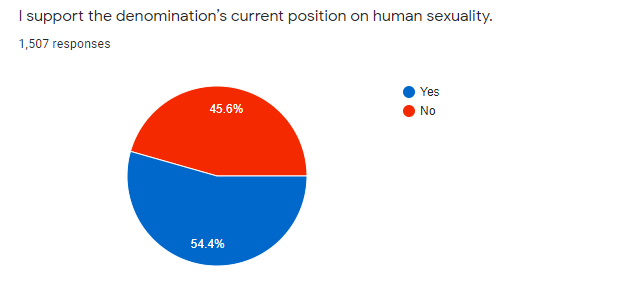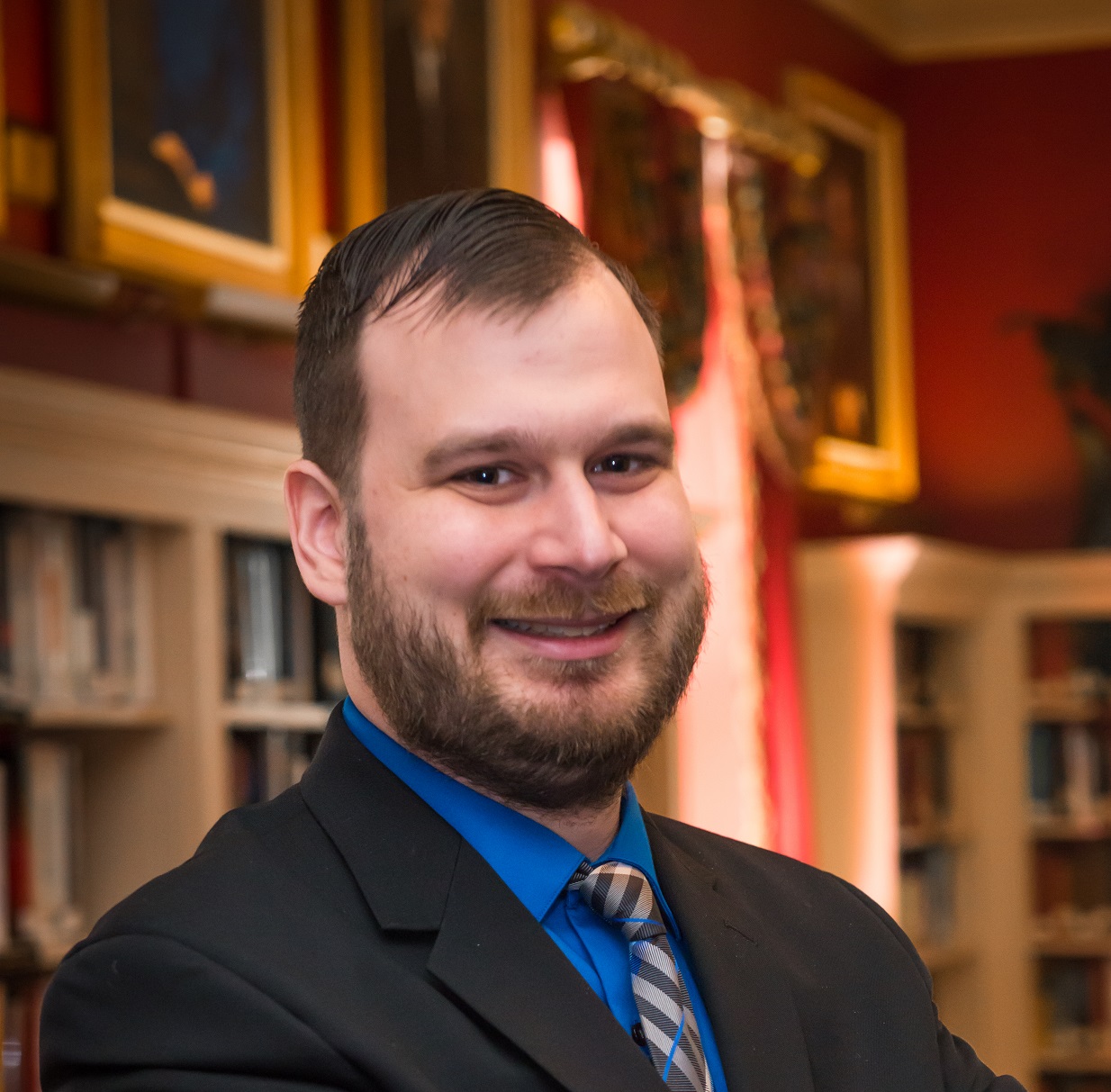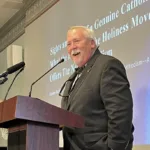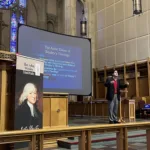As the United Methodist Church prepares for a formal division, the need has become widely acknowledged. But there is still a range of speculations about the depth of our internal divisions and how much our presenting disagreements over sexual morality really matter to people.
In my own Indiana Annual Conference, an official email survey was recently conducted, across about a ten-day period, to seek hard data about such questions.
With over 180,000 lay members in our congregations, Indiana is the UMC’s largest annual conference in the North Central Jurisdiction and tenth-largest conference in America.
At last year’s annual conference session, the Rev. Darren Cushman Wood, an outspokenly liberal pastor and original signatory of the Indianapolis Plan, presented a motion to poll those then present “regarding the issues of sexuality.” But this was referred back to the extended cabinet, who responded by emailing out an online poll earlier this month. I am told it was sent to all clergy, all lay members of annual conference, and each congregation’s lay leader.
While I have not seen the results posted in any official forum, for a while, the online poll form had a way of sharing the latest results. I took screen shots of these results as displayed on August 15. These are likely the final results, as this was the day after the poll was scheduled to close, but before the results were removed from public view.
On human sexuality, the survey found a total of 56.3 percent taking a traditionalist position—when we combine those who said “I support the denomination’s current position on human sexuality” (54.4 percent) with those who both said that they did not support our denomination’s current position and then went on to say that what they wanted to change would include “Increas[ing] enforcement and penalties for clergy violation of BOD restrictions regarding personal practice of homosexuality” (1.9 percent). “BOD” is a common acronym for our denomination’s governing Book of Discipline, whose current position prohibits “self-avowed practicing homosexual” clergy as well as “ceremonies that celebrate homosexual unions.”
That leaves 43.7 percent of Indiana United Methodists surveyed taking a liberal position.
But is this really a deal-breaker for people?
Poll participants were asked directly what they would personally be likely to do, as individuals, depending on what happens with our denomination’s official sexuality standards. For some reason, these questions gave separate options for “Leave the UMC” or “Join another denomination.” But since the survey did not explain how the former option would not encompass the latter, it is difficult to read much meaning into how many poll participants chose one way vs. the other to say that they could not remain in the UMC after a particular action or inaction by General Conference.
The survey found that 27.9 percent said that they were “likely to” not remain in the denomination “If the current UMC position remains unchanged.” A much-larger 47.3 percent said that they were “likely to” not remain in the denomination “If the UMC allows ordination and/or marriage for LGBTQAI+ persons.” That leaves only 24.8 percent saying that they would be likely to “Remain with the UMC” either way.
Participants were also asked about their own congregation’s likely response to the two main potential directions our denomination may go on sexual morality. The framing of these questions and their response options seems to have been composed before the “Protocol on Reconciliation and Grace through Separation” dramatically altered the landscape. With survey participants only able to select one response option, it was not immediately obvious why the option of “Leave the UMC by exercising the disaffiliation option currently available” (in apparent reference to the “gracious exits” procedure adopted by the 2019 General Conference, which has been criticized as too burdensome for most congregations) could not be combined with either of the other options offered for departing congregations (“Become an independent congregation” or “Join with another denomination”).
In any case, the summary of these responses showed that “If the UMC allows ordination and/or marriage for LGBTQAI+ persons,” a slight majority of 53 percent of respondents believe that their own congregation would be likely to depart from the UMC (one way or another) and less than half of that, 25.9 percent, believe that their congregation would be likely to quit the UMC “If the current UMC position remains unchanged.” That leaves only 21.1 percent who would expect their congregations to “Remain with the UMC” either way.
There was an impressive response rate of 1,507 separate entries for this online survey.
In reviewing the listed characteristics of respondents, I did not see any obvious, dramatic “stacking.” Some were concerned that this survey leaves out those who do not have email or regular internet access. But to be fair, that is a difficult challenge to overcome. While our conference is divided into ten districts, an notably large 20.5 percent of survey-takers were from the relatively more liberal-leaning Central District. But to be fair, that district does have more people than others. The age distribution tilted a bit older. But to be fair, so do the demographics of our clergy (especially when retirees are included), and the laypeople who actually show up at annual conference or are elected to such leadership positions. Only 50.6 percent of respondents were laity, although we laity make up over 99 percent of Indiana United Methodism. But to be fair, voting rights at annual conference are theoretically divided between equal numbers of clergy and laity, and it makes sense that clergy would tend to feel relatively more invested in our denomination’s future so as to be more likely to respond.
On that last point, given how last year’s delegate elections showed that our laity are significantly more conservative than our clergy, the true overall mood of Indiana United Methodists as a whole is likely significantly more conservative than would be suggested by such a poll that was basically evenly divided between clergy and laity.
To read a pdf of my screen shots for the full results, click here. Unfortunately, these screen shots do not display all of the precise numerical percentages for some of the smaller slices of the various pie charts.






Comment by Reynolds on August 24, 2020 at 7:22 am
I do not understand how clergy cannot see the damage that they are trying to inflict on the church. Don’t they look at PCUSA or TEC and see the dramatic decline in membership. Can they really be this naive? You talk to some of these liberal clergy what do they say off the record?
Comment by PFSchaffner on August 24, 2020 at 10:06 am
The common wisdom holds that the clergy are in general to the left of the laity. I suspect that there a similar divide between the more clergy-like, politically engaged, laity (e.g. members of Annual Conference and congregational lay leaders) and the rest of us. In other words, isn’t the fact that the laity were represented in this poll by the lay *leadership* not itself a kind of ‘stacking’?
Comment by Lee D. Cary on August 24, 2020 at 10:17 am
Reynolds, your concern is reasonable. But, when people feel strongly enough about positions on morality in the context of their faith beliefs, the concern with wider consequences to the whole fade away. Both sides share a felt righteousness attached to their separate, incompatible, and unreconcilable positions.
SARS-CoV-2 brought an unanticipated delay is executing the split that became inevitable when “Progressives” declared they would not abide by the 2019 General Conference vote. The UMC died at that moment.
Beginning the day after the 2019 GC vote, the Progressives could have exited the denomination, and formed their own institutional church. Instead, they opted for continued resistance aiming to claim primary ownership of the existing one.
But, look, the UMC entered a sustained, numerical decline long before 2019. It is, and for years has been, a failing organization within the U.S. The split just advanced the inevitable, with the hope that everyone could relocate to a place where the credo matched their beliefs.
Instead of a thoughtful split, the UMC yielded the restructuring timetable of a virus, and, thereby, exacerbated the process, unnecessarily IMHO. That, I submit, was a big mistake.
So, instead of a planned, deliberate split with minimum acrimony, we have – by analogy – the lawyers on both sides continuing to debate over who gets the dog and which car. Meanwhile, the kids are reaching adulthood and leaving the house anyway.
Comment by Lee Cary on August 24, 2020 at 10:21 am
PFSchaffner: Your question is valid. I believe the answer is “Yes” – stacked polling. But then, I’ve long wondered if there is any other kind these days.
Comment by Diane on August 24, 2020 at 9:34 pm
Let the leftist clergy depart. Evangelical Christian traditionalist Jerry Falwell Jr,, a major religious superstar leader who champions traditional Christianity, family values, and is an outspoken religious and political advocate for marriage being between one-natural-woman and one-natural-man, could no doubt lead the traditional wing of the UMC and its laity. I understand he’s out of a job. You could put his charisma to work on your behalf. After all, he’s using that familiar traditional-Christianity line of being the victim (the devil being the pool boy who’s outing him).
Comment by William on August 25, 2020 at 5:11 pm
Diane — it’s most likely that you’ve noticed that “wolves dressed in sheep’s clothing” come in all varieties. My prayer is that all these people will find Jesus, forgiveness, and salvation.
Comment by John Smith on August 29, 2020 at 12:39 pm
Write poll questions is a combination of science and art in which intent is paramount. I would expect the AC in this case was trying to drum up support for the liberal position both by its choice of respondents and the use of multiple, similar answers which would split up dissenting answers. In addition the polling data means nothing without know response rates. How many orthodox did not answer because they have moved on from the UMC or feel their opinions are ignored by the “leadership” or are simply awaiting the coming split and did not waste much or any time on the poll?
The real question is how the AC will use the results; that it has disappeared says much.
Comment by George on August 30, 2020 at 9:23 pm
It appears that the “secular christians”will be having their way very soon. Anything goes
when it comes to sex. No shame. No sin. Love, love, love. But wait. They have another hurdle to clear but I’m sure they will clear that one also. Abortion. When was the last time your heard a Methodist preacher talk of it from the pulpit ? Better yet, when was the last time your preacher talked of sin ? Our Church is in real trouble. What will the future bring us next ?
Comment by Jim on September 1, 2020 at 9:34 am
George, a study of the book of revelation tells us that we are in the age of the apostate church. The true body of believers, those who hear the Shepherd’s voice will persevere. So the true church is not by any means in trouble.
Comment by Marc Haughton on September 4, 2020 at 3:42 pm
Whose church is it anyway, clergy or laity? In my opinion, clergy serve at the pleasure of the laity. It is an open secret that Annual Conference delegates around the country are being chosen from pro-LGBTQ laity. I say if clergy want a pro-LGBTQ church, let them leave to form it.
Comment by Sally 23 on September 24, 2020 at 6:38 am
When the LCMS seminary leadership became apostate in the 70s, the seminary president and his staff were told to leave by the denomination president. They could not take the seminary building with them. Radical churches in defiance of church teaching left the LCMS but could not take the good name of the denomination with them.
I don’t understand why the unelected self-appointed members of the Protocol are being allowed to abrogate the 2019 St Louis vote of the UMC. And to arrogate the good name of the UMC to themselves.